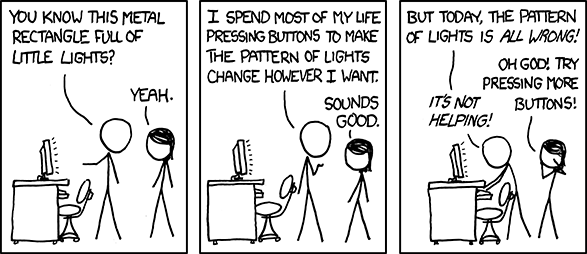I’m clicking my mouse as fast as I can but nothing is happening.
How many clicks until my awesome app is finished?

There lies your problem, ditch mouse use vim(neovim if want to impress the ladies).
vims that thing were you type emoticons everywhere right? :q :w :e
It’s 2024 we only use emojis now 😎
:u :w :u
Hmmmm I think for that you’re gonna want to use emacs
Careful with that, occasionally you can develop some pretty nasty emacs hand

I find myself in a state of uncertainty regarding the particular group of ladies to which you are making reference within the confines of our conversation.
Emacs for coding. Fight me.
I agree Emacs is agreat OS, but sadly it doesn’t have any good text editor.
It does(evil)
The mistake is clicking it, and not speaking to it. Try “hello computer”.
Have you tried clicking on rhythm? Have you tried different rhythms?
As a developer I object to your assumption that I need a mouse to do my job. The only thing I need a mouse for is outlook and I’d definitely be more productive without it.
This is my imposter syndrome.
I’m a senior engineer now and I’m a big mouse user. It’s more intuitive for me. My productivity is certainly not bottlenecking on how fast my hands move on the keyboard. .
My productivity is bottlenecked by the number of meetings I have to attend, random slack messages that need to be responded to, and distractions IRL.
I’m not going to shame anyone about using a mouse unless you also always right click to copy/paste.
Only because I have figured out how to copy from vim to other apps without the mouse yet.
If you ever find out a way, please DM me
I’ll probably get back to you in a few years, still mastering the motions and actions.
Haha, same lol
Hey, if you’re still wondering, I found this on SE: https://vi.stackexchange.com/questions/84/how-can-i-copy-text-to-the-system-clipboard-from-vim
Thank you for this, now I know I have 26+ registers to store stuff in as well as the system clipboard! Honestly been so busy I haven’t touched my computer in over a week.
Nah fuck the haters, the keyboard-only workflow may be technically more productive, just like a Dvorak is better than a QWERTY, but what matters is your output and your quality.
People will spend hours learning things that save them seconds.
One of the best programmers I worked with was a hunt and peck typist.
His code was meticulous. I frequently learned things reading his PRs.
Pair programming with him otoh…
I choose to eschew my mouse when I can because it’s easier. I don’t have to move my arms around as much, and I can work quicker. It’s more comfortable. All of this is a preference thing, why should anyone do something my way if it’s not how they prefer?
Great perspective. If we are codeving or screen sharing, I’m fast and fluid. I just move differently.
Skiing vs snowboarding
Disclaimer: I have never used this but I did a Google for you. It looks reasonably maintained.
It’s for navigating web documentation when arrow keys are too fine but page up/down keys are too coarse.
I guess you could hit tab 9000 times to get to the right hyperlink. I’ve done that when setting up Hyperland on an Nvidia GPU and my cursor was there but invisible.
“If you wish to be a writer, write.”
Epictetus delivered this burn over 1900 years ago.
Is that actually a burn? It depends on the context.
It’s the same thing whenever I hear somebody say “I wish I could draw like that.” You probably can, but it would take hundreds of hours of practice. Of course, people wish that there was some shortcut, so that they could get the skill without all the work.
Yeah but I feel like there’s a million books been written since that time which point out how vapid this quote is. To write one must know what you want to say and how to convey it, do you really think it’s better to just dive into a task unprepared and muddle through rather than learn first the structure and ideals behind such work?
I would say both. You need to learn by trying things out, making your own mistakes and finding a style. Then you get input from the outside world on why some peculiar structure make sense or just giving helpful tips. Then you try out more, apply those tips and see what works for you. But you can read as much helpful input as you want, it won’t be any good without you trying to apply it and practice.
At the end of the day, both are required. You need to study to be effective at what you’re doing, but at the end of the day the only way words get on paper is writing. You’ll also get more out of learning these structures and ideals trying to apply them after you have a bit of time just floundering, getting a feel for the actual task.
Yeah, came here to compare. Both are wrong. If you wish to be a writer, write. If you wish to be a good writer, learn something. Same with programming, except programming requires something to function so it’s even worse in that regard.
Fuck me right in my ADHD. But it is true
Pick a language. Keep it simple. Make something.
Bonus points if it’s something very simple that you’ll use.
Tic tac toe. Fizzbuzz. A score pad for a game. Something that can theoretically be done in an hour (if you were an expert).
If anyone genuinely feels this way and wants to get started in coding, I highly recommend doing one of the mooc.fi courses. Codecademy is fine as a taster/refresh but don’t waste money on the premium when something like mooc is available for free.
Don’t forget to RTFM
Someone documented enough of a thing to call it a manual?
Manual? You mean the half-finished wiki someone put together that is the only source of information while also missing the information I need?
I started a CS club in college and it was crazy how many members would tell me this. They would ask me questions like I hadn’t picked up programming the year before and taught myself via the internet. If you want it, it’s out there.
Pfft imagine using a mouse to code.
I’m sure it works fine when held like a pen…
Classic result of a business man in charge of a software company.
LPT: work for a company where the decision maker comes from an engineering background, not a business background.
You’re welcome.
I mean there must be a reason why someone would want to be a dev. I would go from there
What if I wanna learn to code because I want to make more money than what I’m making now but lack creativity to make something like a game or an app that’s supposed to be good practice?
You don’t need to make something unique, if your goal is to learn.
The best thing you can do is to build something that solves a problem for you, or to build something that already exists that you know well.
As for money, given that companies seem to love layoffs lately, I would say that higher salaries only matter if you are employed. It’s an employers market right now, and a lot of people are really struggling to find work again, even from large companies like Amazon and Google.
Learn finance and bookkeeping; work for a bank. Software development is not lucrative; the high-paying jobs are fundamentally tough and cause burnout. Median employment at big software companies is maybe 2-3yrs and it will ruin your ability to relate to other humans.
Or work for a software development related to finance and bookkeeping so you get the downsides of both.
I try to keep an eye out for repetitive tasks that might make good projects. I just started a python script that’s going to download all my google photos so i can free up my cloud storage.
Think of it more like problem solving. Plenty of jobs use software engineers just to code bespoke tools suited to exactly what they need. Someone else will tell you what it should do, you just have to translate that into code. The hard part is more figuring out what they really need/want because what they tell you isn’t always what they want.
Sometimes motivation can make your better in forced way
Your case same like mine actually. in the end i forced to learn programming because it’s digital era & everything will be digital at some point, at first i admit i suck at everything but as time goes on i can made something better and betterI still remembered the first time i forced my way i learned about programming world especially web dev 14 years ago. I learned WordPress, why i learned it ? because it can make website really really fast, it’s high demand in my country (even today), you can make easy peasy money with it since my client doesn’t care about what tools you used as long as the website is launch and meet their requirements, & it suits for client that have very tight budget
Well nowadays i still learning how to make website & apps in proper way (like true programmer does). I admit it’s hard since i always use the easy way to cheat it, but i will made it through
Maybe next time I’ll learn how to make games since nowadays games popularity has rised so much compared way back then
Be aware that learning to code is not a safe bet for making money in this market. Of course it’s better to have coding skills on your resume than nothing. Coding also complements other white collar skills well (eg. program Macros in Excel or use Jupyter for bespoke data analysis). But code alone is unlikely to get you cash, in my opinion.
Hold on, no one said I had to learn to know how to code.
Where is the guitar?
How do you expect people to become rockstar https://codewithrockstar.com/ devs without a guitar?!
For many, like me, coding just isn’t how our brain works. Even if we are interested in it it’s basically impossible to get a grip on it. I can figure out code that’s already written and do basic editing of it but anything more than that just doesn’t click no matter how much time I spend trying to learn.
It takes 3-6 months for the concepts to click, speaking from experience.
The funniest thing for me is that the definition of object oriented programming is a source of confusion as a beginner yet the most succinct definition as an intermediate/ expert.
I definitely feel this. I had to take a programing course in university and I was easily able to follow along up until the lesson on pointers, whereupon I completely lost the thread and never recovered.
I’ve known a good number of computer scientists over the years, and the general consensus I got from them is that my story is neither unique nor uncommon.
Yeah, some folks have trouble with pointers, and computer-engineering curricula are designed to discourage folks from taking third-year courses if pointers don’t make sense. It’s a stereotype for a reason. I’d love to know if there’s an underlying psychological explanation, or if pointers are just…hard.
I am but one man whose only education in programming was a first year university course in C from almost two decades ago (and thus I am liable to completely botch any explanation of CS concepts and/or may just have faulty memories), but I can offer my own opinion.
Most basic programming concepts I was taught had easily understood use cases and produced observable effects. There were a lot of analogous concepts to algebra, and functions like
printfdid things that were concrete and could be immediately evaluated visually.Pointers, on the other hand, felt designed purely of and for programming. Instead of directly defining a variable by some real-world concept I was already familiar with, it was a variable defined by a property of another variable, and it took some thinking to even comprehend what that meant. Even reading the Wikipedia page today I’m not sure if I completely understand.
Pointers also didn’t appear to have an immediate use case. We had been primarily concerned with using the value of a variable to perform basic tasks, but none of those tasks ever required the location of a variable to complete the calculations. We were never offered any functions that used pointers for anything, either before or after, so including them felt like busywork.
It also didn’t help that my professor basically refused to offer any explanation beyond a basic definition. We were just told to arbitrarily include pointers in our work even though they didn’t seem to contribute to anything, and I really resented that fact. We were assured that we would eventually understand if we continued to take programming courses, but that wasn’t much comfort to first year students who just wanted to pass the introductory class they were already in.
And if what you said is true, that later courses are built on the assumption that one understands the function and usefulness of pointers despite the poor explanations, then its no wonder so many people bounce off of computer science at such a low level.












